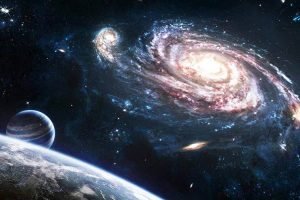In the previous post I had posted how the God does not accept nor approve one’s sins or virtuous deed. Let us elaborate a little more on this. This is the most common misbelief of the people that they are rewarded or punished by the God who supervises every action of a human being. And God says only due to delusion (Maya) the living entities think like this.
The first thing to understand is that God is not responsible for any action of a living entity be it good or bad. As per the actions of our previous karmas we act as per the directions of our senses. As we identify ourselves as a body, mind and intellect controls the actions done by our body. The actions or karmas create the result which we call fate. We are the sum total of all the karmas we have done in the past. In this way we are also going to be the sum total of all the actions we are doing at the present moment. So the only way to change our future is to change our actions. How do we do it? The mind, guided by the impressions (Sanskaras) of the intellect, is the director of all the karmas. Sansakaras are nothing but the thoughts those have been accumulated over a period of time or over lives we have lived. Thus if we can the thought processes we can change our actions thus change our fate.
We will talk how to go about changing our thought process in order to change our actions. Coming back to our original discussion, it is important to remember all the time that we are responsible for what we are today and will be responsible for what we are going to be tomorrow. Our fate is in our hands. So is our life. We just have to take that responsibility. The Lord says in Bhagavad Gita in Chapter 5, shloka 22::
ये हि संस्पर्शजा भोगा दु:खयोनय एव ते l
आद्यन्तवन्त: कौन्तेय न तेषु रमते बुध: ll
ye hi sansparśha-jā bhogā duḥkha-yonaya eva te
ādyantavantaḥ kaunteya na teṣhu ramate budhaḥ
ye—which; hi—verily; sansparśha-jāḥ—born out of association with the sense organs; bhogāḥ—pleasures; duḥkha—misery; yonayaḥ—source of; eva—verily; te—they are; ādya-antavantaḥ—having a beginning and an end; kaunteya—Arjun, the son of Kunti; na—never; teṣhu—in those; ramate—takes joy; budhaḥ—the wise
The pleasures that arise due to the attachment of sense organs (the sense objects), are verily a source of misery, as they are considered to be temporary pleasure. O son of Kunti, the wise do not take any delight in such pleasures which have a beginning and an end.
The pleasure arising in contact with the sense objects are short lasting. These material achievements derived from honor, praise, success, etc are only satisfying to the mind. They don’t last forever. These material enjoyment do not satisfy the soul as they are finite and has sense of deficiency which is inherent. There is no end to such pleasures as the mind craves for more and more of it and becomes dissatisfied when there is a lack. Worldly pleasures are finite, on the other hand, the bliss of God is infinite, and so it gives complete satisfaction. Once achieved, it remains forever. And it is a matter of choice for an individual to decide to either indulge in the sensual pleasure or try to achieve the state of Infinite Bliss. And this can be attained by changing the perceptions towards life and living. This is where the concept of free will comes in. It does not matter what an individual is doing for a living as long as one is aware that one is not doing it solely for sense gratification. That is why the Lord said earlier that the exercise of one’s ‘free will’ results in good or bad deed and one must not blame God for them. It is due to ignorance of those who do not even realize that they possess the freedom to choose their actions and thus hold God responsible for their mistakes or praise the God for rewarding them.
To be continued…


















Add Comment